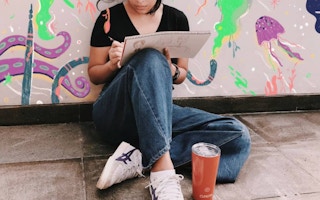At a time when the Covid-19 pandemic has cast a cloud over circular consumption culture, a reuseable container service has launched in Jakarta in a bid to put a dent in the Indonesian capital’s waste problem.
To continue reading, subscribe to Eco‑Business.
There's something for everyone. We offer a range of subscription plans.
- Access our stories and receive our Insights Weekly newsletter with the free EB Member plan.
- Unlock unlimited access to our content and archive with EB Circle.
- Publish your content with EB Premium.
Called Cupkita, the new service takes aim at Jakarta’s throwaway culture that sees individual cafés consume between 125 to 1,000 single-use cups in a day in the city of 10 million people.
The service, which went live a week on 6 July, just after coffeeshops reopened after more than three months of shutdown, can reduce up to 2,100 kilograms of daily waste, according to the service’s founders.
Cupkita is a joint venture between Muuse, a Singapore-headquartered firm formerly known as Revolv that launched a reuseable cup service in Singapore last year, and Enviu, a sustainable business kickstarter.
To use the service, customers download the Cupkita mobile app, scan a cup at a participating café, and pay a refundable deposit of IDR 50,000 (US$3.50) through a mobile e-wallet.
After use, the cup can be returned at any of the participating outlets in central and south Jakarta. The cup is then cleaned and put back into the system.
The system is free for customers to use, as long as the cups are returned. Retailers pay about IDR 500 (3 US cents) per cup rented, which works out cheaper than buying single-use cups.
Cupkita is aimed at middle-class, eco-conscious Jakartans, and is initially available in three outlets - Donuts & Coffee, Warung Fotkop and Al’Cal Coffee - with a plan to expand the initiative to seven outlets next week.
The cups themselves, 100 of which are in initial circulation, are made from stainless steel, chosen because the material is durable, food-safe, easily recyclable and of appealing quality to users, said Muuse’s chief operations officer, Jonathan Tostevin.
It is unclear how many times the steel cups would need to be reused before they offset the carbon footprint of the equivalent useage of disposable cups.
Tostevin admitted that it was a challenging time to be launching Cupkita. Many retailer-run reuseable container schemes, particularly bring-your-own options, have been withdrawn for fear they’ll aid the spread of the virus. Muuse’s service in San Francisco, where cafés and restaurants remain closed, has been suspended since March because of the severity of the coronavirus outbreak.
Tostevin said that scientific studies supported the safety of reuseable containers, pointing to a recent study co-signed by more than 100 scientists that found that reuseables do not pose a viral contagion risk if basic hygiene rules are followed.
“Also, reuseable cups do not come with the negative externality that single-use does, particularly in a place like Jakarta, where a huge amount of waste is created every day,” he said. The Indonesian capital generates up to 2,400 tonnes of plastic trash daily.
Participating Cupkita retailers also specially train staff how to clean Cupkita’s standardised cups, which puts them at a hygiene advantage over BYO schemes, said Tostevin.
Jakarta is Muuse’s fifth launch location. Its borrow-use-return model has been trialled in offices, universities and at events in Bali, Singapore, Hong Kong and San Francisco. The concept was among the finalists for last year’s The Liveability Challenge, a competition to find sustainability solutions for cities.
Tostevin said that the key to the success of the Muuse model work is making the service as convenient as possible to users who might otherwise use disposables, and offering as many pick-up and drop-off locations as possible for the reuseable cups.
Muuse works with more than 40 outlets in Singapore, and is launching a partnership with online food delivery service FoodPanda this week to bring reusables to people still working from home.












